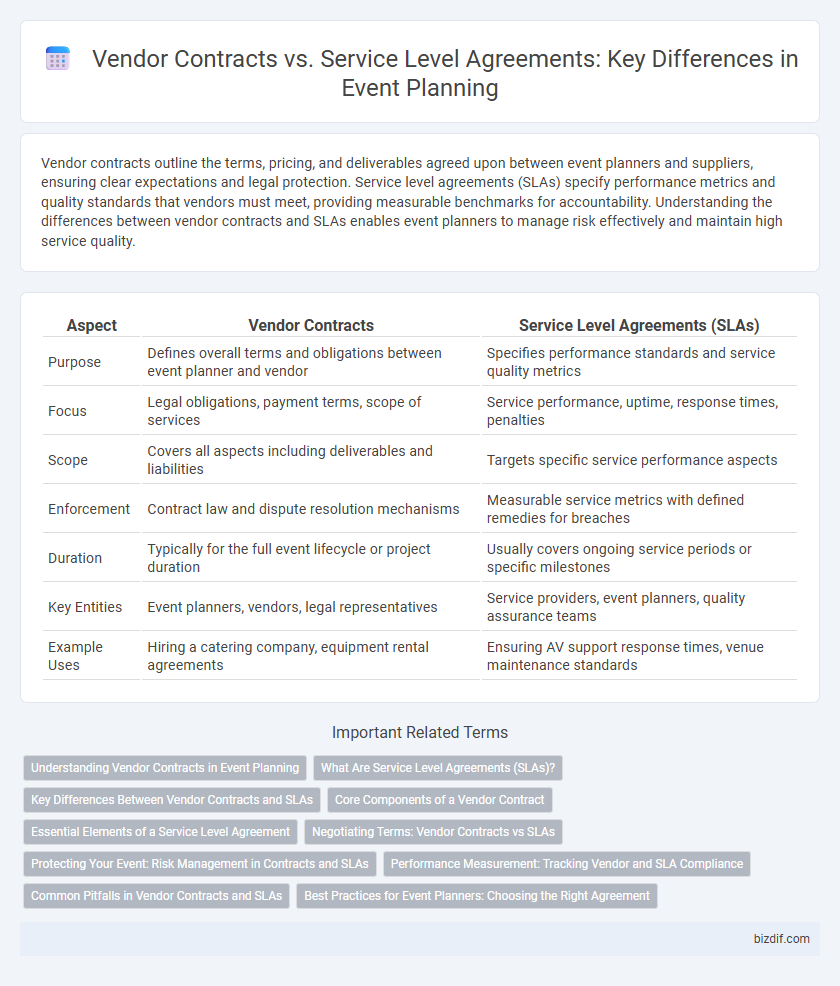Vendor contracts outline the terms, pricing, and deliverables agreed upon between event planners and suppliers, ensuring clear expectations and legal protection. Service level agreements (SLAs) specify performance metrics and quality standards that vendors must meet, providing measurable benchmarks for accountability. Understanding the differences between vendor contracts and SLAs enables event planners to manage risk effectively and maintain high service quality.
Table of Comparison
| Aspect | Vendor Contracts | Service Level Agreements (SLAs) |
|---|---|---|
| Purpose | Defines overall terms and obligations between event planner and vendor | Specifies performance standards and service quality metrics |
| Focus | Legal obligations, payment terms, scope of services | Service performance, uptime, response times, penalties |
| Scope | Covers all aspects including deliverables and liabilities | Targets specific service performance aspects |
| Enforcement | Contract law and dispute resolution mechanisms | Measurable service metrics with defined remedies for breaches |
| Duration | Typically for the full event lifecycle or project duration | Usually covers ongoing service periods or specific milestones |
| Key Entities | Event planners, vendors, legal representatives | Service providers, event planners, quality assurance teams |
| Example Uses | Hiring a catering company, equipment rental agreements | Ensuring AV support response times, venue maintenance standards |
Understanding Vendor Contracts in Event Planning
Vendor contracts in event planning establish clear terms, payment schedules, and deliverables to secure services such as catering, equipment rental, and venue arrangements. These contracts protect both parties by outlining responsibilities, penalties for non-compliance, and cancellation policies, ensuring event execution aligns with client expectations. A thorough review of vendor contracts minimizes risks and avoids misunderstandings, ultimately supporting seamless event coordination and successful outcomes.
What Are Service Level Agreements (SLAs)?
Service Level Agreements (SLAs) define the specific performance metrics and quality standards that vendors must meet throughout the event planning process. These agreements ensure accountability by outlining response times, deliverables, and penalties for non-compliance, facilitating smoother coordination and risk management. Unlike generic vendor contracts, SLAs focus narrowly on measurable service outcomes critical to event success.
Key Differences Between Vendor Contracts and SLAs
Vendor contracts outline the general terms, pricing, and deliverables agreed upon between event planners and vendors, while Service Level Agreements (SLAs) specify detailed performance metrics, quality standards, and response times for service delivery. The key differences include contract scope, with vendor contracts covering overall partnership terms and SLAs focusing on measurable service expectations. SLAs enable event planners to enforce accountability and ensure vendor performance meets agreed-upon benchmarks critical to event success.
Core Components of a Vendor Contract
Core components of a vendor contract in event planning include detailed scope of work, payment terms, delivery schedules, and liability clauses to ensure clear obligations and risk management. These contracts specify service expectations, deadlines, and penalties for non-compliance, providing legal protection for both parties. Clear definitions of responsibilities and communication protocols further enhance accountability and seamless event execution.
Essential Elements of a Service Level Agreement
Service Level Agreements (SLAs) in event planning clearly define performance standards, response times, and quality metrics to ensure vendor accountability. Essential elements include scope of services, measurable performance benchmarks, and remedies for non-compliance. These precise terms help maintain service quality beyond the general obligations outlined in vendor contracts.
Negotiating Terms: Vendor Contracts vs SLAs
Negotiating terms in vendor contracts involves defining pricing, delivery schedules, and liability clauses to ensure clear responsibilities and protect event budgets. Service level agreements (SLAs) focus on setting measurable performance standards, response times, and quality metrics to guarantee service reliability and client satisfaction. Understanding the differences between these legal frameworks helps event planners secure both operational efficiency and contractual security.
Protecting Your Event: Risk Management in Contracts and SLAs
Vendor contracts and service level agreements (SLAs) are critical tools for protecting your event by clearly defining responsibilities, deliverables, and performance standards. Vendor contracts outline specific terms such as payment schedules, cancellation policies, and liability clauses, while SLAs focus on measurable service benchmarks and remedies for non-compliance. Combining these documents ensures comprehensive risk management by minimizing misunderstandings and providing legal recourse if vendors fail to meet agreed-upon standards.
Performance Measurement: Tracking Vendor and SLA Compliance
Vendor contracts establish the legal terms and conditions of the agreement, while Service Level Agreements (SLAs) specifically define measurable performance metrics such as response time, quality standards, and deliverables. Tracking vendor and SLA compliance requires continuous monitoring using Key Performance Indicators (KPIs) like on-time delivery rates, issue resolution time, and service uptime percentages. Effective performance measurement ensures accountability, minimizes event disruptions, and helps maintain vendor reliability throughout the event planning process.
Common Pitfalls in Vendor Contracts and SLAs
Common pitfalls in vendor contracts and service level agreements (SLAs) for event planning include vague scope definitions that lead to misunderstandings about deliverables and timelines. Failure to specify performance metrics and penalties for non-compliance often results in inadequate service quality and unresolved disputes. Overlooking detailed payment terms and exit clauses can expose planners to financial risks and inflexible termination conditions.
Best Practices for Event Planners: Choosing the Right Agreement
Event planners should carefully evaluate vendor contracts and service level agreements (SLAs) to ensure clear expectations and responsibilities are defined for event execution. Vendor contracts typically cover payment terms, deliverables, and cancellation policies, while SLAs focus on performance metrics and quality standards essential for successful event outcomes. Prioritizing detailed agreements tailored to the scale and complexity of the event minimizes risks and fosters smoother vendor relationships.
Vendor contracts vs Service level agreements Infographic

 bizdif.com
bizdif.com